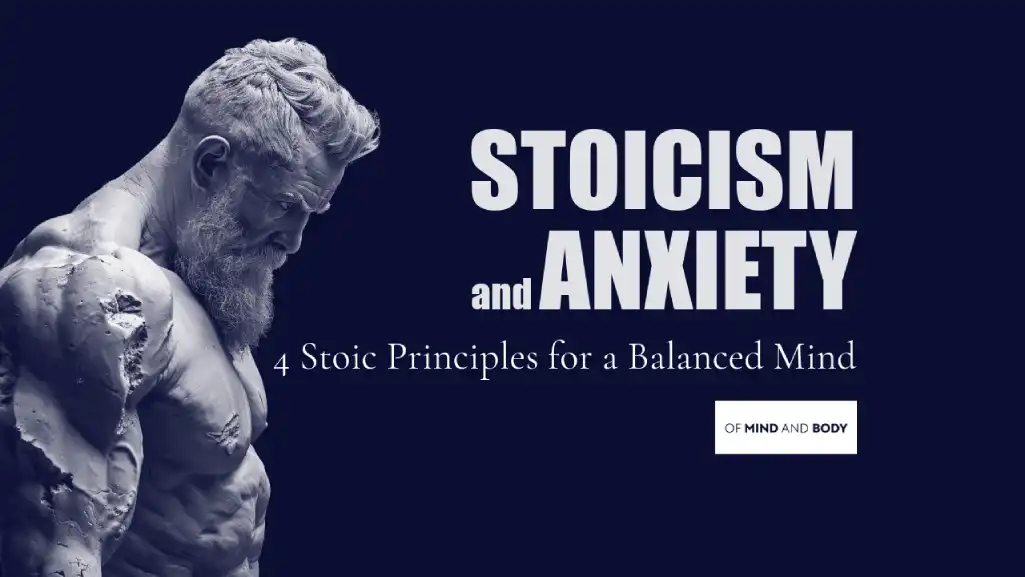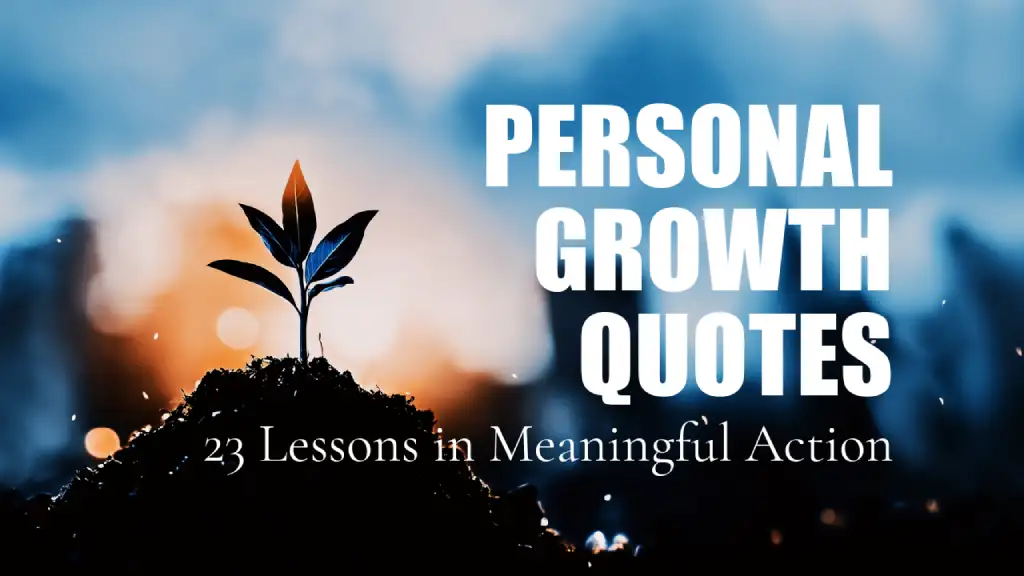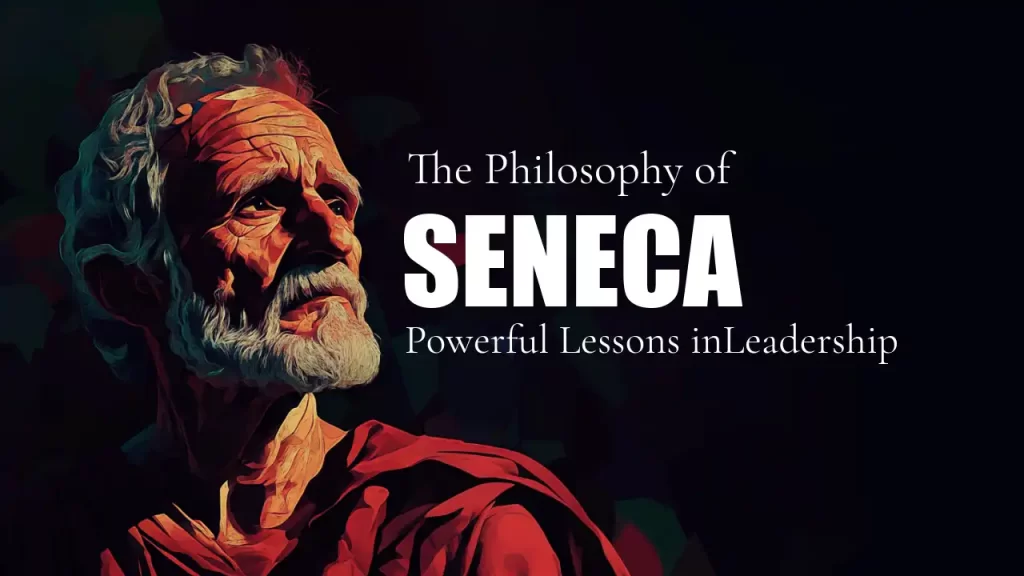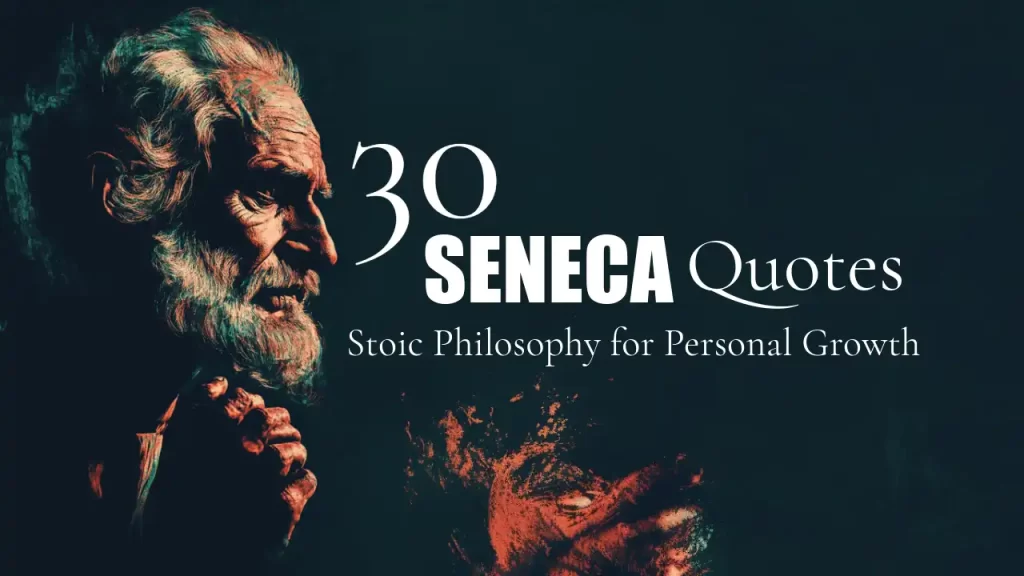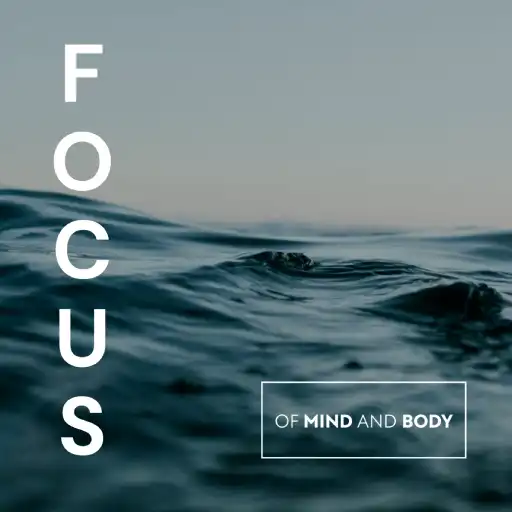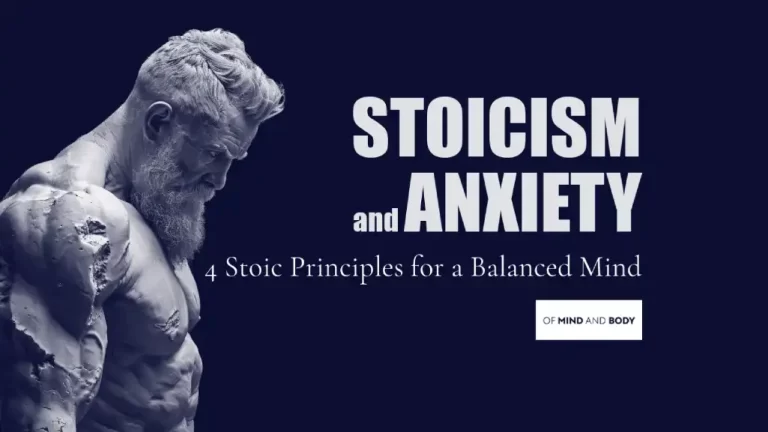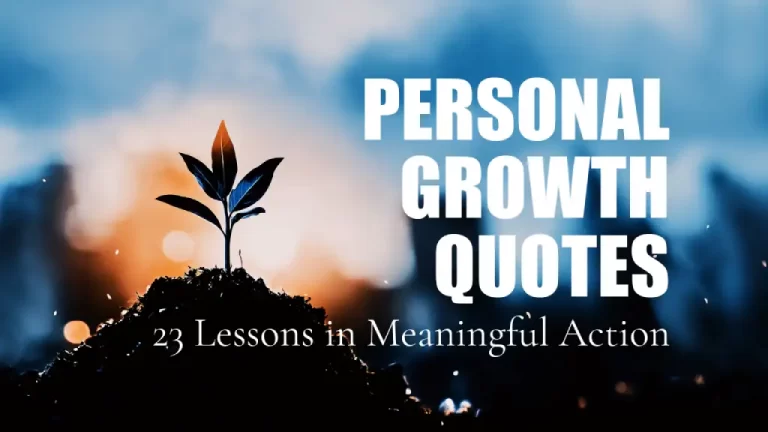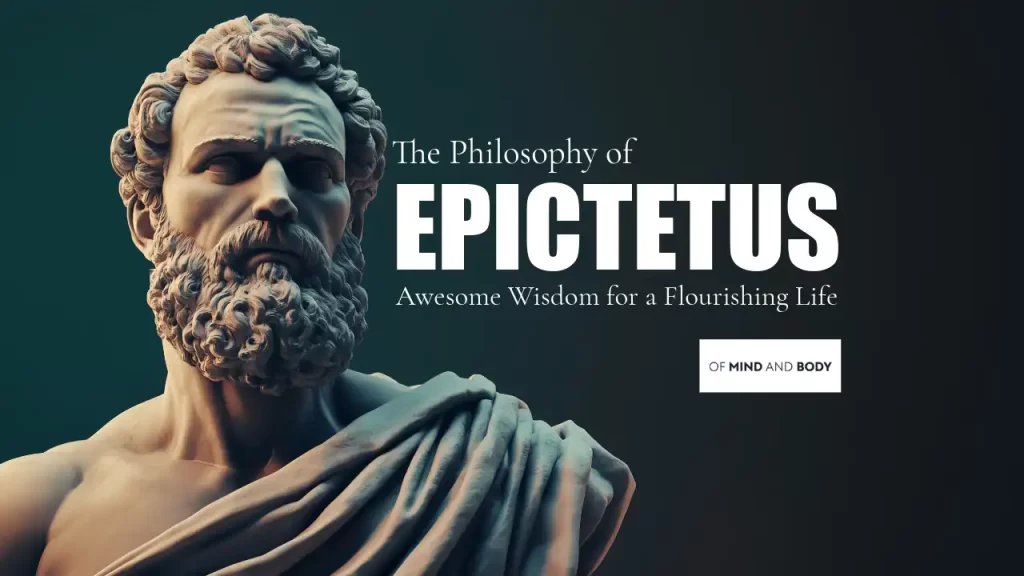
Have you ever wondered how ancient wisdom can help us navigate modern life’s complexities? The philosophy of Epictetus, a former slave who rose to prominence as a Stoic thinker, offers profound insights into living a fulfilling and resilient life. Let’s explore the key concepts of his teachings and their relevance today.
Epictetus’ Early Life and Background
Epictetus was born around 55 AD in Hierapolis, Phrygia (modern-day Turkey). His early life was marked by slavery; he was born to a slave woman and thus became a slave himself. His master, Epaphroditus, who had also been a slave before being freed by Emperor Nero, recognised Epictetus‘ intellectual abilities and recommended him to study under Musonius Rufus, a renowned Stoic philosopher.

Musonius Rufus profoundly influenced Epictetus, shaping his philosophical outlook and teaching him the principles of Stoic philosophy. The impact of Rufus’ teachings is evident in Epictetus‘ later works, which closely align with Rufus’ philosophical ideas.
After gaining his freedom, likely following the death of Nero in 68 CE, Epictetus established his own school of philosophy in Nicopolis, Greece. Despite the challenges, including the banishment of philosophers from Rome by Emperor Domitian in 89 CE, Epictetus continued to teach and share his Stoic principles until his death around 135 AD.
The philosophy of Epictetus, preserved by his student Arrian in works such as the Discourses and the Enchiridion, have had a lasting impact on both ancient and modern thought, emphasising the importance of focusing on what we can control and accepting what we cannot.
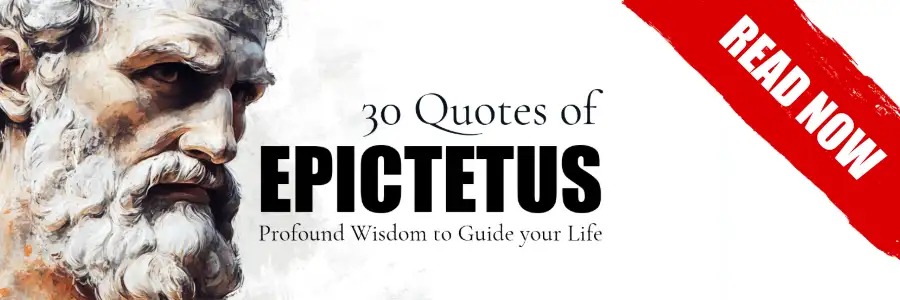
Epictetus’ Core Philosophical Concepts
The philosophy of Epictetus revolves around several key concepts that continue to resonate today.
Dichotomy of Control:
One of the foundational ideas in Epictetus‘ teachings is the distinction between what we can control and what we cannot. He emphasised that our thoughts, beliefs, and actions are within our control, while external events, other people’s opinions, and natural occurrences are not. This principle is encapsulated in the famous quote;
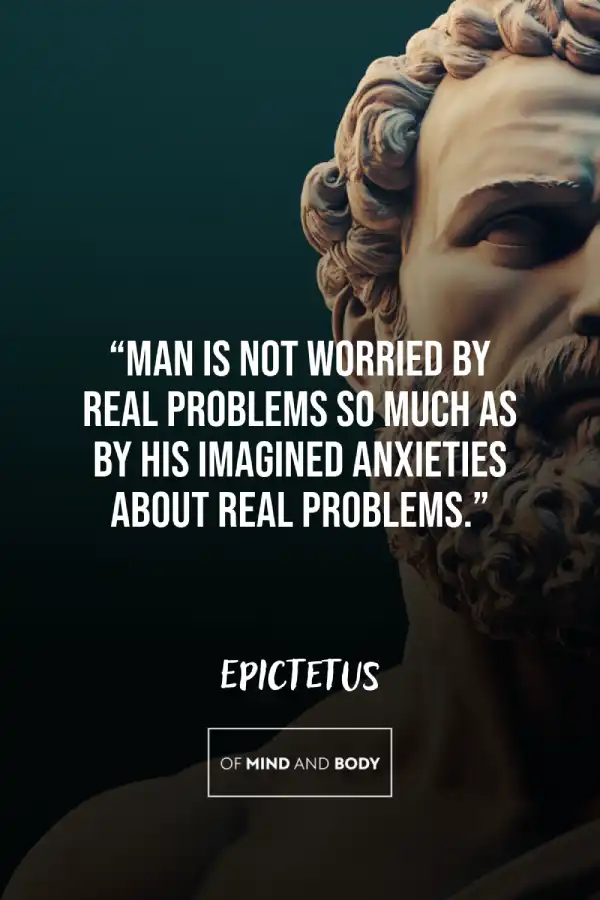
“Man is not worried by real problems so much as by his imagined anxieties about real problems.”
Consider how often we find ourselves stressed for seemingly no reason. The latent anxiety induced by constant exposure to the relentless news cycle and social media feeds creates a pervasive sense of fear, anxiety, and want.
This background hum of unease can bleed into our everyday lives, causing us to view situations negatively without real cause. Our default setting becomes one of unease and suspicion, as we are silently influenced by factors beyond our control. By fixating on these uncontrollable elements, we only amplify our anxiety and frustration.
The philosophy of Epictetus teaches us that by focusing on what we can change—our own responses and attitudes—we can reduce unnecessary suffering and lead more serene lives.
Ask yourself; how much of what you see on the news can you influence? And more importantly, how much of it affects you directly?
By directing your energy towards what you can control, you minimise stress and maximise your effectiveness.
This principle is not just philosophical but practical. In modern psychological practices, this concept is similar to what is known as locus of control, where individuals with an internal locus of control believe they can influence their own outcomes, often leading to better mental health and resilience.
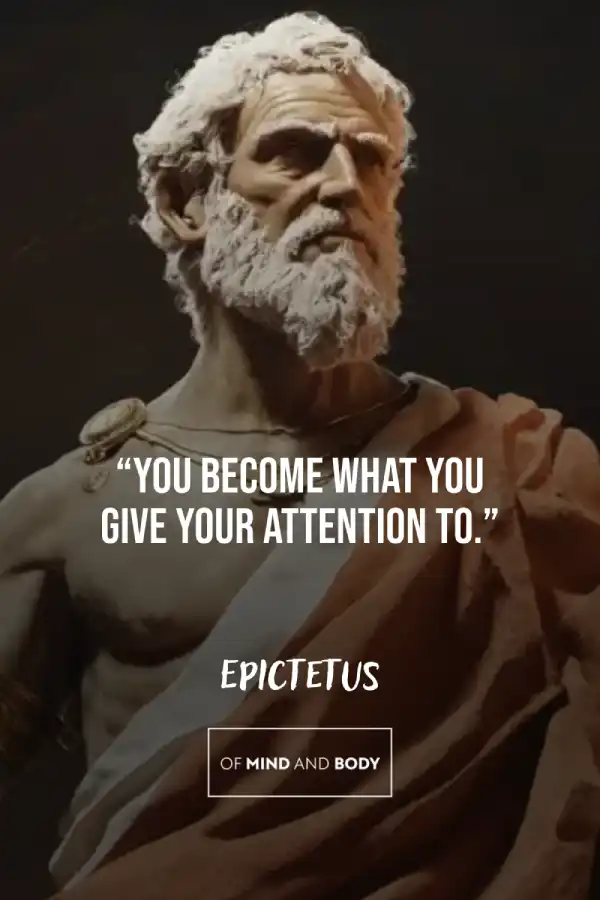
“You become what you give your attention to.”
Proairesis (Moral Choice/Will)
Central to the philosophy of Epictetus is the concept of proairesis, or moral choice. He believed that our ability to make rational decisions and choose our responses to external events defines our character and freedom.
This idea underscores the importance of personal responsibility and ethical living. For example, when faced with an insult, our immediate reaction might be anger or hurt. However, Epictetus would advise us to exercise proairesis by choosing a rational response, such as considering the intent behind the words and deciding not to take offence. This choice reflects our character and maintains our inner peace.
Proairesis empowers us to take ownership of our actions and reactions, fostering a sense of autonomy and integrity. It is about making conscious, deliberate choices that align with our values and principles, rather than reacting impulsively or out of habit. This approach not only enhances our personal freedom but also contributes to a more ethical and harmonious society.

Eudaimonia (Flourishing Life)
The ultimate goal of Stoic philosophy is eudaimonia, often translated as “happiness” or “flourishing.” For Epictetus, achieving eudaimonia involves living in accordance with nature and reason, embracing virtues such as wisdom, courage, and justice. This holistic approach to well-being emphasises the development of inner virtues over the pursuit of external pleasures.
The philosophy of Epictetus encourages us to remain true to this principle with the following quote:
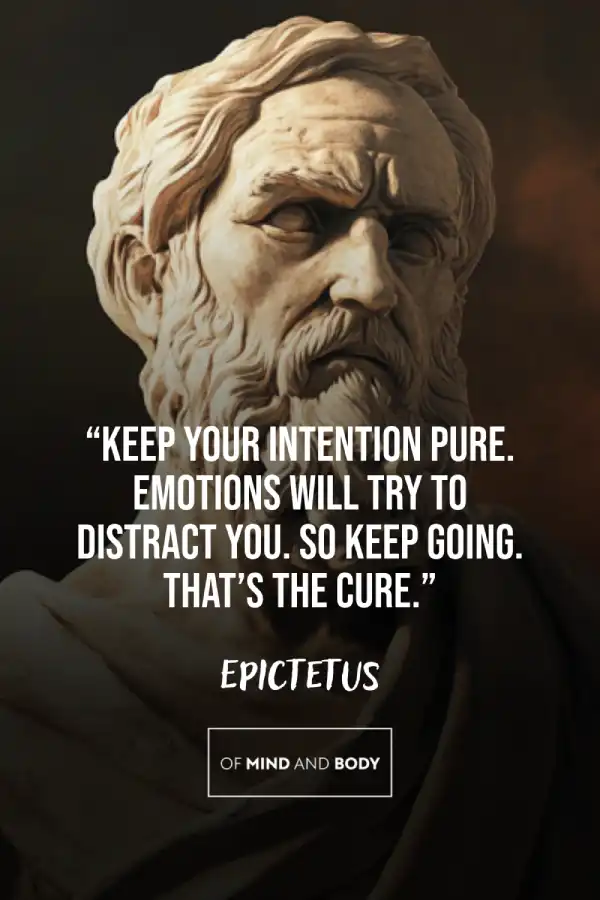
“Keep your intention pure. Emotions will try to distract you. So keep going. That’s the cure.”
Eudaimonia is not about fleeting happiness but about living a deeply fulfilling and meaningful life. It requires cultivating virtues that guide our actions and decisions. For instance, wisdom helps us discern the right course of action, courage allows us to face challenges steadfastly, and justice ensures we treat others fairly and with respect.
By prioritising the cultivation of inner virtues, we align our lives with the Stoic ideals of rationality and natural order, leading to a state of true flourishing. This focus on internal development rather than external achievements resonates with modern concepts of psychological well-being and personal growth.
Emphasising the cultivation of such values often requires us to re-frame our perspective, especially in a society that increasingly values external validation and material success. This shift in viewpoint can seem counter-intuitive, but ultimately it is profoundly rewarding as it fosters a deeper sense of fulfilment and resilience. By looking at our circumstances from this new angle, we embrace the intrinsic worth of virtues like wisdom, courage, and justice, and find true contentment within ourselves.
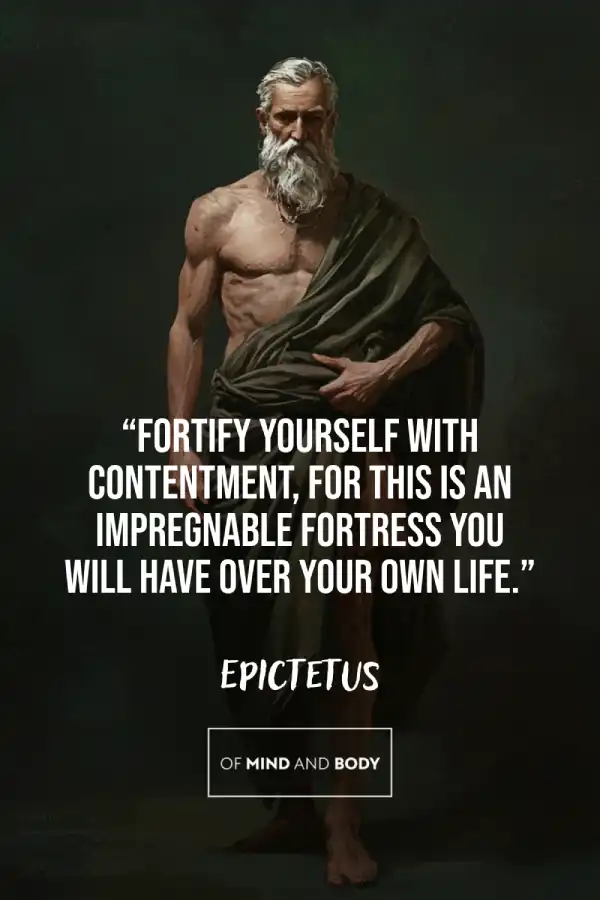
“Fortify yourself with contentment, for this is an impregnable fortress you will have over your own life.”
How might you start applying these ideas today to transform your perspective and enhance your life?
Epictetus’ Key Works and Their Impact
Epictetus did not leave behind any written works himself; instead, his teachings were meticulously recorded by his devoted student, Arrian. Arrian, who was deeply influenced by the philosophy of Epictetus, took detailed notes during his lectures and compiled them into several key texts. The most significant of these are the Discourses and the Enchiridion (Handbook).
Arrian‘s recordings have been instrumental in ensuring that the philosophy of Epictetus endured through the centuries, influencing countless philosophers, including Marcus Aurelius, and continuing to be relevant in modern philosophical and psychological practices.
Discourses
The Discourses of Epictetus, organised by his student Arrian, are comprised of four books that delve into a broad spectrum of Epictetus‘ teachings on Stoic philosophy. These texts cover essential topics such as ethics, logic, theology, and practical wisdom for daily living. Arrian meticulously structured these teachings into dialogues and lectures, ensuring that the conversational style Epictetus employed in his instructions was faithfully preserved. This format not only makes the philosophy accessible but also reflects the dynamic and engaging nature of Epictetus‘ teaching methods.
The comprehensive nature of the Discourses offers profound insights into the philosophy of Epictetus. Each book addresses different aspects of Stoic thought, providing detailed guidance on how to live a virtuous and fulfilling life. For instance, Epictetus emphasises the importance of understanding what is within our control and what is not, a central theme in Stoic philosophy that helps individuals maintain tranquillity and resilience in the face of external challenges.
Additionally, the Discourses explore the concept of proairesis, or moral choice, highlighting the role of rational decision-making in achieving personal freedom and ethical living. Epictetus‘ discussions on theology reflect his views on the divine and the natural order, underscoring the Stoic belief in living in harmony with nature and the cosmos.
The Enchiridion
Following the detailed teachings preserved in the Discourses, the Enchiridion, or Handbook, serves as a distilled version of Epictetus‘ philosophy, offering concise and practical advice for daily living. This manual is designed to be easily accessible, providing key Stoic principles in a format that readers can readily apply to their own lives. The Enchiridion emphasises the core Stoic tenet of focusing on what is within our control—our own thoughts, actions, and attitudes—while accepting what lies beyond our control, such as external events and other people’s opinions.
This approach is encapsulated in Epictetus‘ famous dictum:
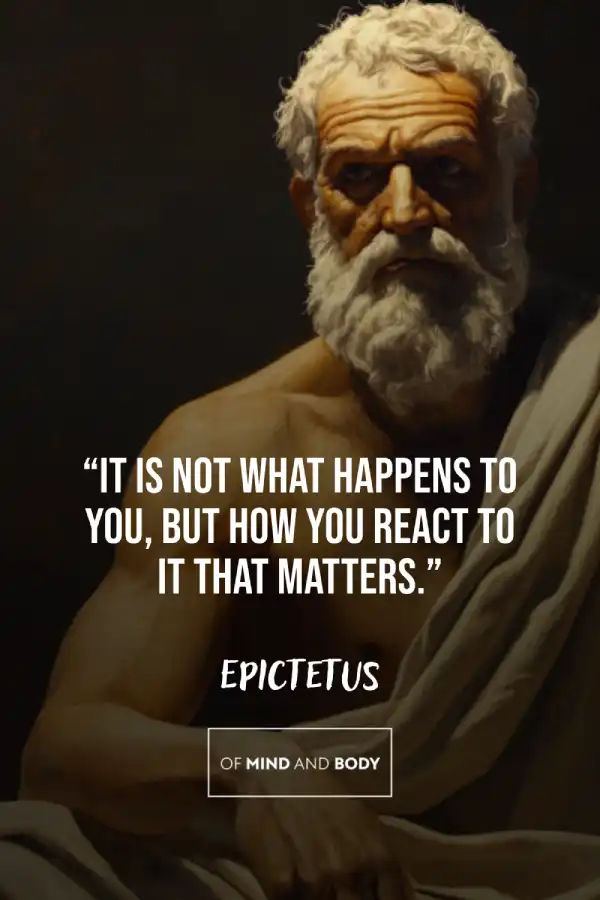
“It is not what happens to you, but how you react to it that matters.”
By training oneself to maintain a proper perspective, individuals can achieve a state of inner tranquillity and resilience regardless of external circumstances. The Enchiridion also underscores the importance of moral character and virtuous living, encouraging readers to cultivate qualities such as wisdom, courage, justice, and temperance.
Throughout history, the Enchiridion has been highly influential, serving as a guide for personal conduct and moral philosophy. Its practical wisdom has been embraced by a wide range of readers, from ancient philosophers to modern self-help enthusiasts. The text has been translated into numerous languages and has inspired various adaptations, reflecting its enduring relevance and appeal.
The influence of the Enchiridion can be seen in the writings of notable figures such as Marcus Aurelius, whose own meditations on Stoic philosophy echo the principles outlined by Epictetus. In contemporary times, the Enchiridion continues to be a valuable resource for those seeking practical guidance on how to live a fulfilling and virtuous life.
Its teachings encourage readers to develop a Stoic mindset, fostering a sense of inner peace and resilience that can help navigate the challenges of modern life. Whether one is facing personal hardships, professional setbacks, or the daily stresses of life, the Enchiridion provides timeless strategies for maintaining equilibrium and finding contentment within.
Practical Applications of Epictetus’ Philosophy

The philosophy of Epictetus offer timeless wisdom that can greatly enhance our daily lives. Here’s how we can apply his principles to build resilience, live ethically, and pursue personal development.
Building Resilience
In our fast-paced and often stressful world, Epictetus‘ concept of the dichotomy of control can be a powerful tool. By clearly distinguishing between what we can control (our thoughts, actions, and attitudes) and what we cannot (external events, other people’s opinions), we can focus our energy more effectively.
For example, if you’re facing a challenging situation at work, instead of stressing over the outcome or the reactions of others, focus on your effort and attitude. You can’t control the results or others’ responses, but you can control how diligently you work and how positively you approach the task. This mindset reduces stress and helps you remain calm and composed.
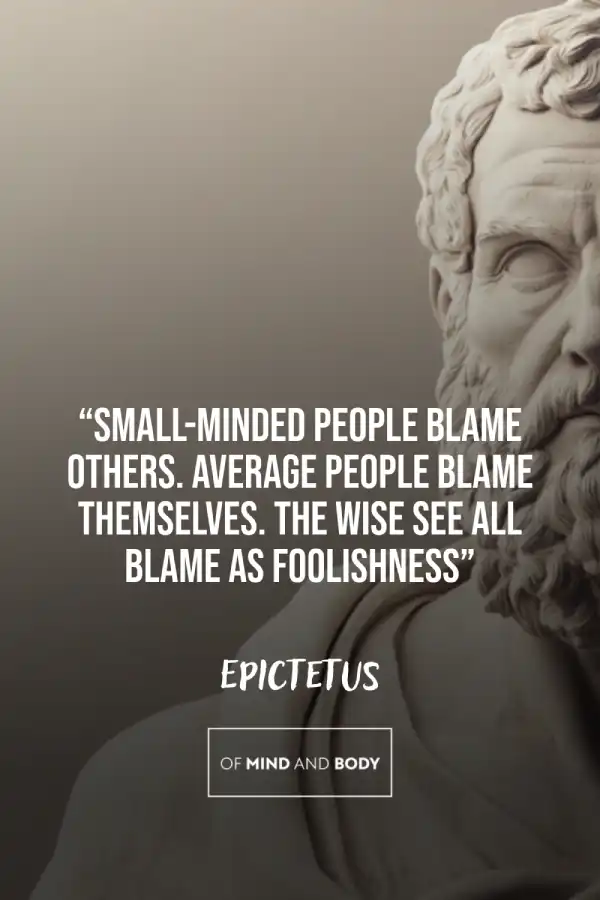
“Small-minded people blame others. Average people blame themselves. The wise see all blame as foolishness”.
Imagine you’re stuck in traffic, a common source of frustration. Applying the philosophy of Epictetus, you recognise that you can’t control the traffic itself, but you can control how you respond. Instead of getting angry, use the time to listen to an audiobook or enjoy some music. This shift in perspective can transform a potentially stressful situation into a more pleasant experience, enhancing your mental well-being.
Ethical Living
Epictetus emphasised the importance of living ethically and in harmony with nature, which involves understanding our place in the world and fulfilling our duties to others. By cultivating virtues such as wisdom, courage, and justice, we can lead more meaningful and fulfilling lives.
For instance, practising courage might mean standing up for a colleague who is being treated unfairly, even if it’s not the easiest option. Wisdom could involve taking time to consider the long-term consequences of your actions before making a decision. Justice might be about treating everyone with fairness and respect, regardless of their position or status.
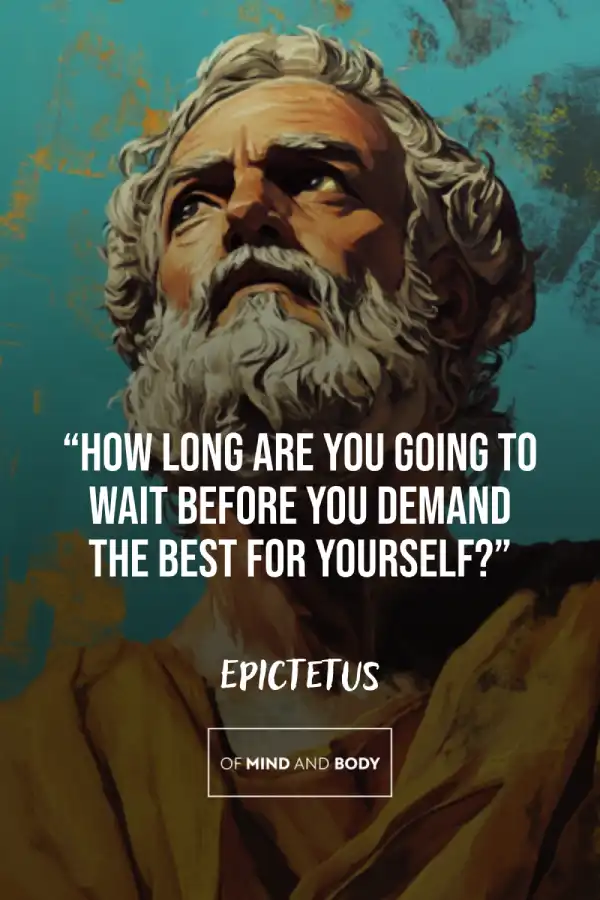
“How long are you going to wait before you demand the best for yourself?”
Living ethically also means being true to yourself and your values. If you value honesty, strive to be honest in all your interactions, even when it’s difficult. This alignment with your core values creates a sense of integrity and peace.
Personal Development
Setting personal standards and principles to guide our behaviour is a key aspect of Stoic philosophy. Epictetus encouraged his students to “prescribe some character and form of conduct to yourself, which you may keep both alone and in company.” This advice remains relevant for anyone seeking to improve their character and lead a virtuous life.
Consider setting a daily intention or personal mantra that aligns with your values. For example, you might decide to approach each day with gratitude, focusing on the positive aspects of your life. Or you might commit to practising patience, reminding yourself to remain calm and understanding in stressful situations.
Personal development also involves continuous learning and self-reflection. Take time to reflect on your actions and thoughts, and identify areas where you can grow. Celebrate your successes, but also be honest about your mistakes and use them as opportunities for growth.
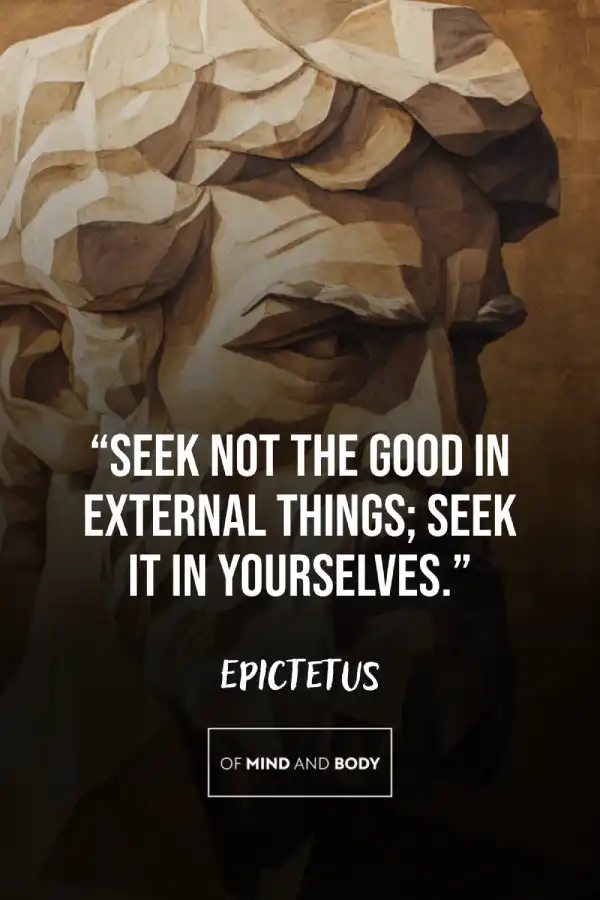
“Seek not the good in external things; seek it in yourselves.”
Incorporating the philosophy of Epictetus into your life can lead to profound changes. By focusing on what you can control, living ethically, and continuously working on personal growth, you can cultivate resilience, find greater peace, and lead a more fulfilling life. So, how will you start applying the philosophy of Epictetus today? Perhaps by taking a moment to reflect on what you can control in your current situation, or by committing to a small act of courage or kindness. The journey to a more Stoic and fulfilling life begins with a single step.
Final Thoughts
The philosophy of Epictetus offers timeless wisdom that can help us navigate the complexities of modern life. By focusing on what we can control, embracing moral responsibility, and striving for eudaimonia, we can cultivate resilience and lead more fulfilling lives.
So, how will you apply the philosophy of Epictetus to your own life?
Reflect on his principles and consider how they might help you find greater peace and purpose.
Frequently Asked Questions
What is the main idea of Epictetus?
The main idea of Epictetus is the philosophy of Stoicism, which emphasizes personal ethics, self-control, and acceptance of one’s circumstances.
What are Epictetus principles?
Epictetus principles are a set of philosophical teachings that emphasize personal freedom, self-discipline, and the importance of focusing on what is within our control. They can help guide individuals towards leading a more fulfilling and virtuous life.
What is Epictetus ethical theory?
Epictetus’ ethical theory emphasizes the importance of distinguishing between what is within our control and what is not. He promotes the idea of focusing on our own thoughts and actions, rather than getting caught up in external events or the actions of others. Epictetus encourages individuals to cultivate virtues such as wisdom, courage, and self-discipline, and to accept the things they cannot change with equanimity. This philosophy is known as Stoicism.
What does Epictetus think about life?
Epictetus believed that life should be accepted as it is and that individuals should focus on what they can control, such as their thoughts and actions. He emphasized the importance of developing inner virtues and living in accordance with reason and nature.


